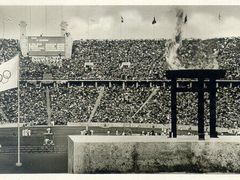Prague - The Olympic torch is being strictly protected and closely watched these days.
Demonstrators all around the world keep trying to put out the flame to protest against the human rights abuse in Tibet, committed by China, the host of the upcoming Summer Olympic Games. Thus the global relay organizers are playing a cat-and-mouse game with the demonstrators.
No one, however, can beat the Czechs in extinguishing the torch. The Czechs were the first one who put out the flame in summer 1936. It was the year that Berlin was to host the Olympics and the Torch relay ritual took place for the very first time.
The incident occured on 30 July after the flame coming from Olympia via Athens, Delphi, Thessaloniki, Sofia, Belgrade, Budapest and Vienna arrived in Prague. Here, in the Old Town Square, on an improvised altar it was welcomed by Prague Mayor Karel Baxa.
And it was the very left-wing demonstrators who regarded the torch relay as propaganda of aggressive germanism and purely political ritual and blocked the approaching torchbearers, so the torch handover was not carried out in time.
Magnesium tubes
The steel tubes produced by Essen company Krupp contained magnesium powder that could burn for only about ten minutes so if the lighting of new torch was prevented, the flame simply died out.
Eventually a spare torch had to be used which was prepared the whole time in the mandatory reserve.
The 290km torch route through Czech territory was otherwise calm. Nonetheless were the torchbearers, each of whom had to cover one kilometer of the route, accompanied by gendarmes, often even on bicycles.
Many members of parliament protested in Prague against the Olympics at that time.
"I cannot imagine a worse mockery of this idea [of the Olympics]. There is not a worse abuse of the Olympic Games ideal than the fact that they are hosted by a country where freedom and human rights have been trampled upon in the most brutal way. And Czechs should leave for such a country? Czechs, the citizens of Masaryk´s democratic country?" bellowed Leopold Vaverka in parliament in December 1935.
No politicization, please
Members of the Sokol movement, an organization that promoted Czech nationalism during the Austrian-Habsburg Empire and later founded Czecholsovak Legions, for which they were banned during the communist regime, refused any politicization of the Olympic Games.
"The German advancement cannot affect our preparations for the Olympic Games nor the Sokol sporting event in Berlin," wrote "Tělocvik" (Sports Education) Magazine after Hitler had occupied the demilitarized Rhineland.
So the biggest Czechoslovak Olympic expedition in the history then (151 men and 13 women) left for Berlin on August 6. And in fact, they did very well - they won three gold and five silver medals.
